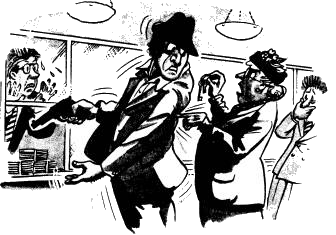 An old lady went out shopping last Tuesday. She came to a bank and saw a car near the door. A man got out of it and went into the bank. She looked into the car. The keys were in the lock.
An old lady went out shopping last Tuesday. She came to a bank and saw a car near the door. A man got out of it and went into the bank. She looked into the car. The keys were in the lock.
The old lady took the keys and followed the man into the bank.
The man took a gun out of his pocket and said to the clerk, “Give me all the money!”
But the old lady did not see this. She went to the man, put the keys in his hand and said, “Young man, you're stupid! Never leave your keys in your car: someone's going to steal it!”
The man looked at the old woman for a few seconds. Then he looked at the clerk – and then he took his keys, ran out of the bank, got into his car and drove away quickly, without any money.
A) Which of these sentences are true (T) and which are false (F)? Write T or F.
1. An old lady went to the bank last Tuesday.
2. A man left his keys in the lock of his car.
3. The old lady gave the keys to the man.
4. Someone stole the man's car.
5. The bank clerk gave the man some money.
6. When the man went away, he did not take any money.
B) Answer these questions.
1. Where did the man go when he got out of his car?
2. What did the old lady see in the car?
3. What did she do then?
4. What did the man do in the bank?
5. What did the old lady do?
6. What did she say to the young man?
7. What did the man do then?
8. Did he steal any money from the bank?
C) Opposites . Put one word in each empty place.
1. The lady was not . . .: she was old.
2. The man did not. . . his keys out of the lock: he left them in it.
3. The man was not. . .: he was young.
4. He did not want . . . of the money: he wanted all of it.
5. He was not . . .: he was stupid.
6. He did not . . . out of the bank: he ran out of it.
7. He did not drive away . . .: he drove away quickly.
8. He did not drive away . . . the money: he drove away without it.

The Old Lady
- Details
- Hits: 15442
